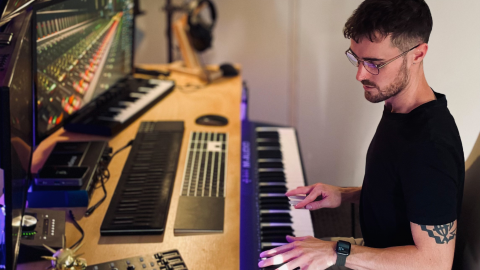From Stage to Screen

Elizabeth Scott from Perform Australia explains what stage actors need to know about screen acting.
Many actors start out in the theatre – either in a school play or musical, or with a local amateur theatre society. But before long, the keen actor realises that the stage is not the only avenue for their talents. Whether inspired by a favourite TV series, or the latest movie release, the theatre actor may start dreaming of a life on the silver screen.
Acting for screen has a few distinct differences from acting for stage, and the theatre actor wanting to transition to screen needs to make a few adaptations.
* Your voice. The stage actor is told, “Project, project, project!” while the screen actor needs to realise the mic is right up close. Using a stage voice into a lapel mic, or even a boom mic, is not going to do anyone any favours, least of all the sound technician! Bring your voice right down. But don’t let this advice make you think the voice is not important for screen. Good vocal technique and articulation are crucial in a good screen performance.=
* Your physicality. In the theatre, you might be in front of an audience of hundreds or even thousands. Your gestures, movements, and expressions need to be big to be seen. But in screen, the camera sees all: every twitch, every nuance in a facial expression, every gentle touch. Your eyes alone can speak a thousand words. So, when acting for camera, you need to contain your entire physicality to what’s in the frame.
 * Script turnaround. When performing in a stage play or musical, you’ll likely have weeks to rehearse and perfect every scene. In a screen project, however, you may get the script only days, or even hours, before you need to perform. In some projects, you won’t even get a whole script – just the pages with your lines in them. So, your job is to prepare your character, memorise your lines, and rehearse all by yourself – then turn up on the day and do the job required. Screen acting requires you to work independently before you even step foot on set. And if you do rehearse with your fellow actors before shooting, it’s going to be minimal.
* Script turnaround. When performing in a stage play or musical, you’ll likely have weeks to rehearse and perfect every scene. In a screen project, however, you may get the script only days, or even hours, before you need to perform. In some projects, you won’t even get a whole script – just the pages with your lines in them. So, your job is to prepare your character, memorise your lines, and rehearse all by yourself – then turn up on the day and do the job required. Screen acting requires you to work independently before you even step foot on set. And if you do rehearse with your fellow actors before shooting, it’s going to be minimal.
* Screen etiquette. The screen environment has its own etiquette around call times, schedules, who to speak to when you have a problem, how to behave on set, and so on – just as theatre has its own requirements and expectations. The stage actor shifting to screen needs to have a working knowledge of the environment they’re now operating in, as well as the workplace health and safety issues faced in that context.
The best way to make the transition from stage to screen is through training. Alongside its CUA40513 Certificate IV in Musical Theatre, perfect for singer/dancer/actors interested in stage work, Perform Australia runs the 10197NAT Certificate IV in Acting for Stage and Screen. This course gives students a good balance in working in both media, allowing them to test out their suitability for screen work, while developing and refining their stage skills.
Images: Stage actors moving to screen need to become familiar with the screen environment, and Student actor Angharad Wise in 'Hamlet' (Photos: Perform Australia).
Check out Performing Arts Courses across the country in our 2020 Course Guide





